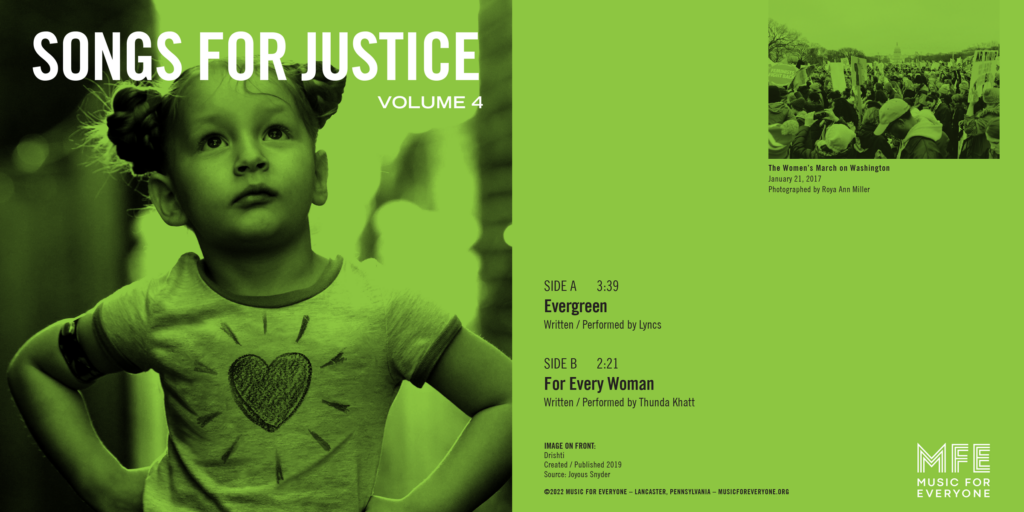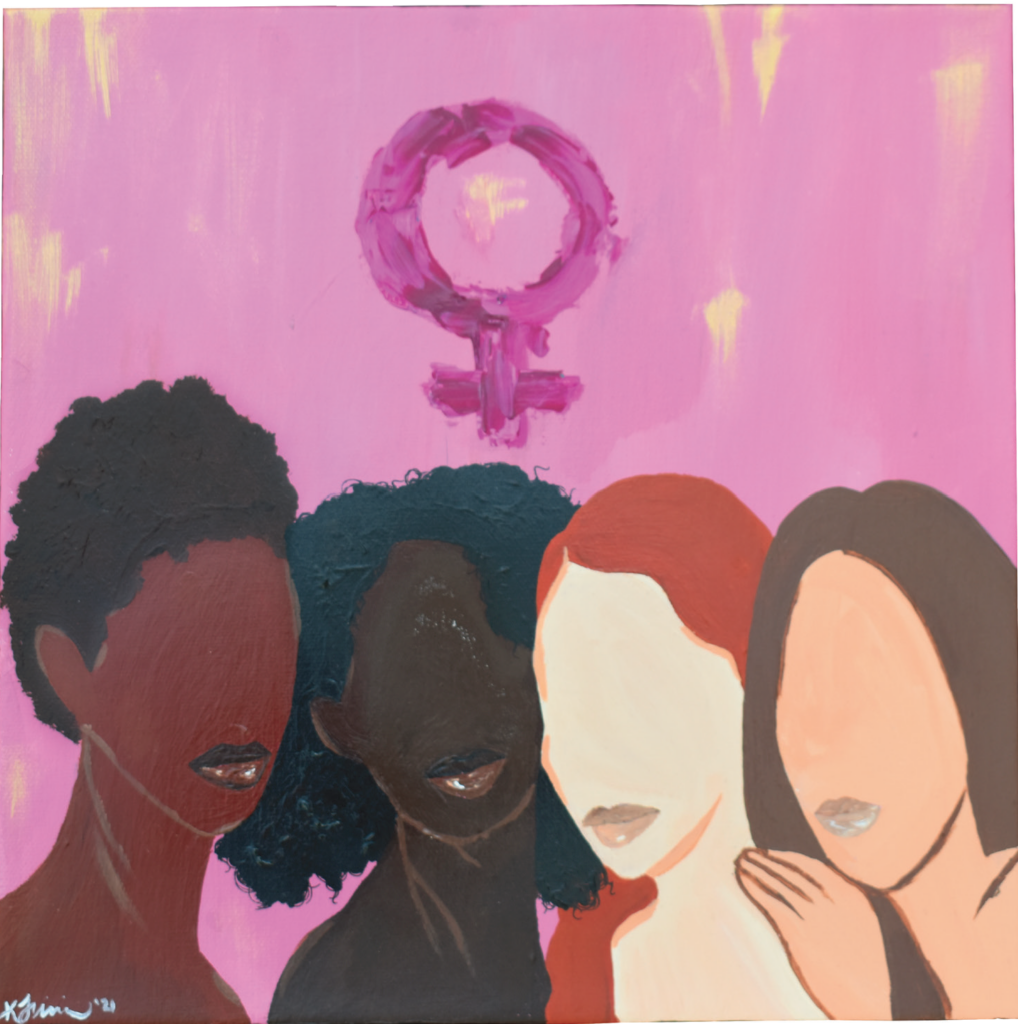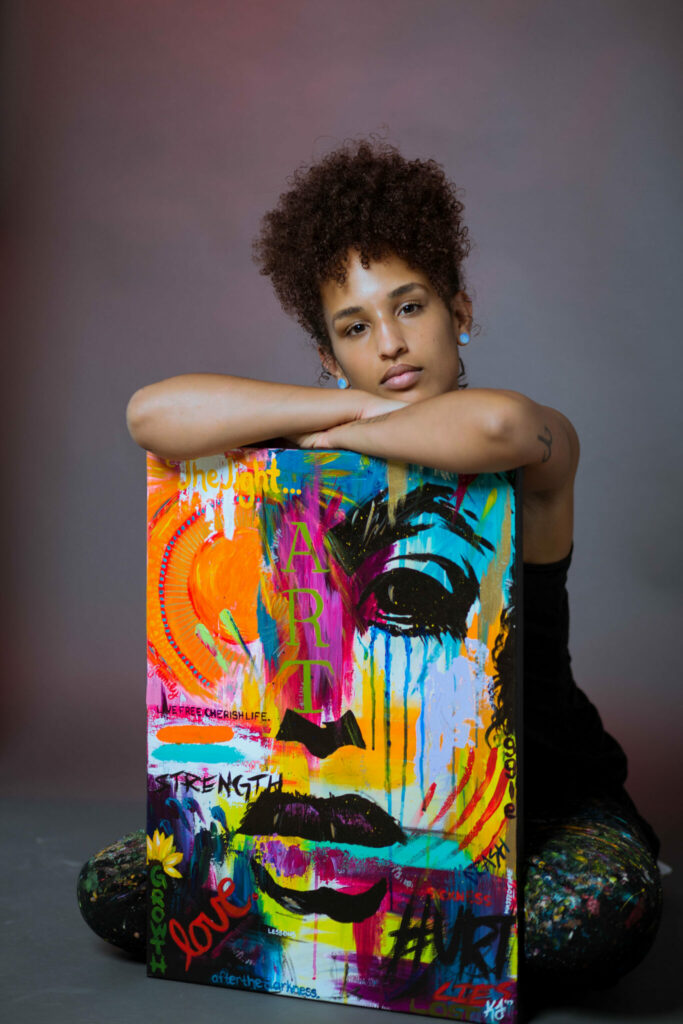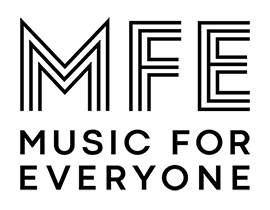Songs For Justice Vol. 4

Inside the Album

Lyncs – “Evergreen”
Evergreen trees are found on every continent, in all weather, and year round they keep their greens. To me, that means that no matter where we go or who we become, we are still our true selves. We keep our greens as time evolves and we grow. I knew I wanted to write a song that captured the feeling of growing up and becoming my truest self, and this metaphor fit perfectly. Every time I find the meaning of life it changes.
Thunda Khatt – “For Every Woman”

I remember the very first time I heard ‘This Is A Man’s World’ by James Brown as a child. The beginning of the song where he repeats “This is a man’s world”, there’s a pause before he continues. In that pause, those literal few seconds, I realized I was angry. Before I realized what he was saying next I thought to myself What do you mean this is a man’s world? Before I was even old enough to understand why, I was offended. That feeling, even decades later, is where ‘For Every Woman’ comes from.
Keisha Finnie
My inspiration comes from simply living life and being a woman of color. I’ve used my art to express my thoughts and feelings around self-identity, being black is a big part of that because the world never forgets to remind me. My art comes from a combination of my love for nature, vibrant color, texture and the female form. It’s a reflection of myself while connecting the viewer to my perspective of the world.
Art has been something I have been drawn to for as long as I can remember. From my first art class in kindergarten, to still creating every chance I get today. I have nothing but love for my craft; I constantly aim to master as many forms and mediums of art as possible. It’s all about growth. Thank you for being on this journey with me.
Peace,


Marianne Colon – Poet
My name is Marianne. I am a Latina born in Flint, Michigan and raised in Lancaster. I learned from a really early age that writing was my calling. I was about 8 years old when I started journaling and writing all my thoughts down. I had an extremely difficult upbringing which is what influences my poetry. My main focus is writing about topics that people do not like to talk about. I write about things that are uncomfortable for people to hear, I bring out the skeletons in the closet. My voice was always silenced when I was younger which is what pushed me to write everything down and think deeply on human choices.

I can tell you
A million and three ways how men
would stare at my figure while they
mentally undress me
As I am,
Trying to tell them about who I am
They respond with
Telling me who they are
But I can
Decipher the ways of a man when
he is interested in my brain or
interested in my looks
Although I am quite flatered that
you think that I get through life
with just a pair of breast
I just want you to understand that
I am just trying to make a sale
with all the knowledge I managed to collect.
My intelligence at times is never
enough, especially when all you
can think about are ways to try and
seduce me...

Alison Kibler
Alison Kibler is a professor of Women’s, Gender, and Sexuality Studies and American Studies at Franklin & Marshall College. She is the author of Rank Ladies: Gender and Cultural Hierarchy in American Vaudeville (1999) and Censoring Racial Ridicule: Irish, Jewish and African American Struggles Over Race and Representation (2015). She is currently writing a book about feminist television activism in in the 1970s and also working on the history of Lancaster’s anti-vice campaign in the early twentieth century.
Historical Context
“Women’s rights activists fought for and won many of the opportunities and freedoms that women enjoy and perhaps take for granted today. Spanning more than 150 years in the United States, the women’s movement gained votign rights for women (with the passage of the 19th amendment in 1920), removed barries to education and employment with federal legislation, and secured greater control over reproduction by expanding access to abortion and birth control and establishing protections against involuntary sterilizations. Yet women’s rights advocates did not just set their sights on public milestones like amendments and laws; they encouraged women to reimagine themselves…”
Community Benefit Organization
MFE is proud to partner with local community benefit organizations who are doing exceptional social justice work. In this volume of Songs for Justice we highlight Milagro House.

Milagro House‘s mission is to provide educational programming, housing, workforce development and life-skills training for women and their children who would otherwise be experiencing homelessness. Our vision is to turn a woman’s goal of getting an education into an achievable reality by removing the barriers to self-sufficiency that women in poverty often experience.
Women living at Milagro House with their children are either working on completing their high school education through our high school equivalency program, or are enrolled in a post-secondary program of study at a local college or certification program.
Milagro House programs are not “one size fits all”, but are customized to leverage the specific resources and supports that each woman and child needs to move forward. This means engaging the women we serve as an active partner in crafting her individualized goals and helping her build a positive framework on which to achieve those goals. The staff role is to support – not dictate – the process and provide the tools, resources and opportunities each woman needs to move forward on her journey.
Our program is built on the foundation that an education opens doors to success; a catalyst that moves families from poverty into the economic mainstream. Empowering women to achieve their educational goals has a positive effect on the families we serve and on our community as a whole. Since 1998, Milagro House has helped women and their children achieve their dream of long-standing success and sustainability through education.

